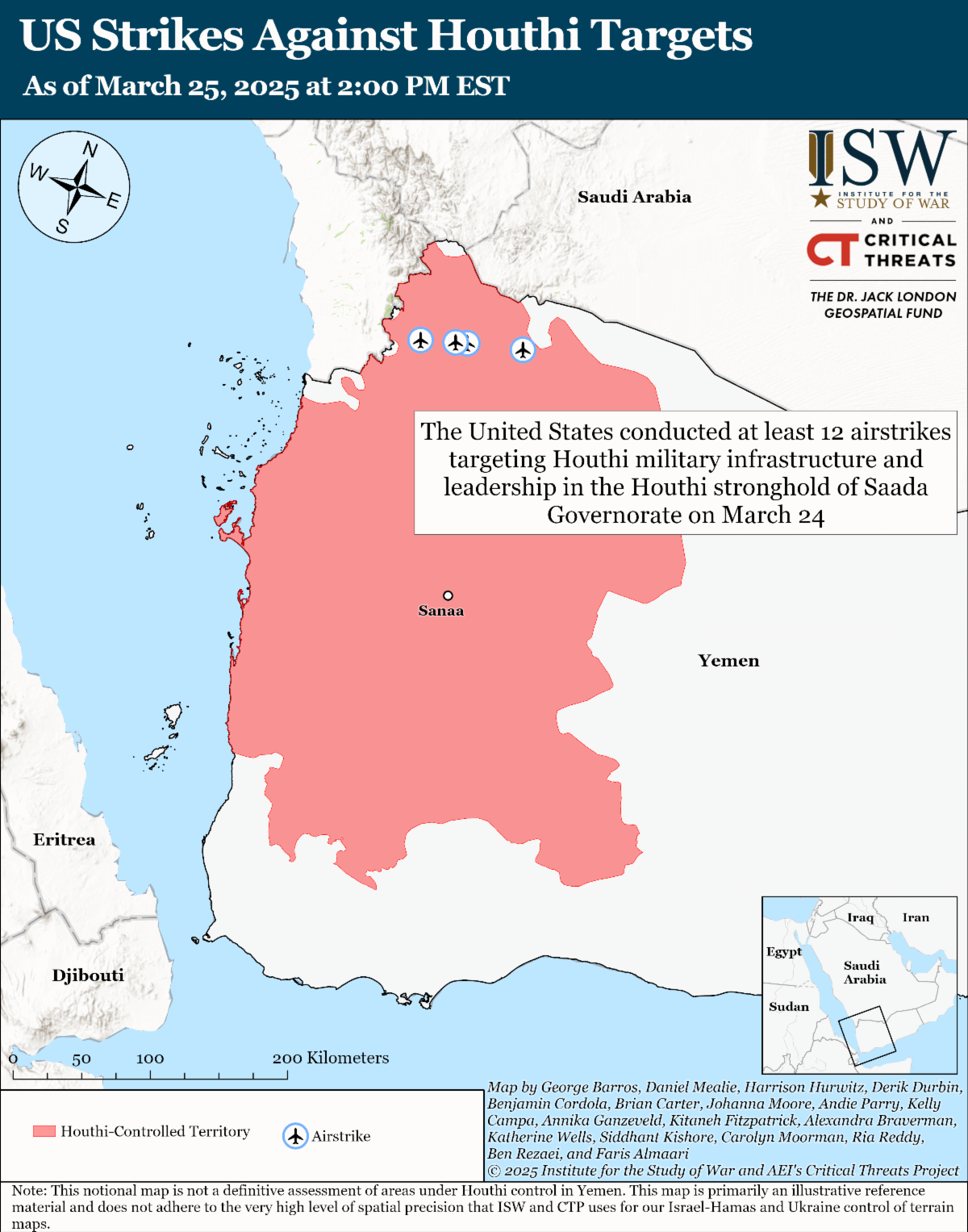Top Iranian officials reportedly authorized Iranian Foreign Affairs Minister Abbas Araghchi to "advance any diplomatic initiative in relation to the United States," according to an Iranian expert close to the regime. It is not clear who precisely authorized Araghchi to begin “any diplomatic initiative,” but Supreme Leader Ali Khamenei would almost certainly make such a decision. Araghchi has historically taken a softer line on nuclear negotiations with the United States compared to the regime’s hardline elements. Araghchi said on March 24 that Iran is open to indirect talks with the United States “through various channels,” though it rejects direct negotiations. Former President Hassan Rouhani and former leading member of the Iranian nuclear negotiating team Mohammad Javad Zarif were previously given "full authority" to advance nuclear talks during the Joint Comprehensive Plan of Action negotiations.
An expected announcement of Syrian President Ahmed al Shara’s cabinet and ministerial appointments will signal how and if Shara intends to extend his personal authority within the executive branch. Shara announced on March 25 that the interim government will comprise 22 ministerial portfolios led by a majority of “newcomers,” suggesting that he will replace the 22 existing ministers. This likely includes dissolving the office of Prime Minister Mohammed al Bashir. Emirati media reported in late February that Shara’s ministerial changes are imminent and are supposed to reflect that Shara understands the concerns about his consolidation of power. This follows widespread concern over Shara’s concentration of executive authority and the lack of checks and balances on the Presidency outlined in the recently announced constitutional declaration.
Shara’s current roster of transitional ministers is nearly entirely composed of bureaucrats that formerly served in the Idlib-based, HTS-controlled Syrian Salvation Government (SSG). At least 18 of the 22 ministers that Shara appointed shortly after coming to power in December 2024 have close ties to or deep experience working with Shara, either through the SSG or through direct participation in HTS. The SSG was nominally independent of HTS but, in practice, subordinate to HTS. Men who have been deeply loyal to Shara and have worked with him since his Jabhat al Nusra days currently hold the largest and highest priority ministerial portfolios, including foreign affairs and intelligence.
Shara’s appointments in the coming days will be a strong indicator of the sort of government and state Shara intends to lead. A bias towards non-SSG, non-Sunni, non-Islamist, and non-HTS backgrounds would indicate Shara’s willingness to form a representative government that represents all of Syria. An opposite bias towards Sunni Arabs, Sunni Islamists, or former HTS and SSG members would indicate that Shara is not willing to form a representative or inclusive government at this time and instead seeks to cement his own control. This would also likely increase the distrust of the Shara government among minority communities, including the Alawites, Kurds, and Druze communities.
The Houthis continue to supplement their Iranian-sourced weapons arsenal by acquiring additional arms and dual-use components through Russian and Chinese commercial suppliers, according to the 2025 Annual US Intelligence Community Threat Assessment report. Local media reported on March 24 that Yemeni border customs seized 800 Chinese-made drone propellers in a shipment bound for the Houthis at the Sarfait border crossing with Oman in southeastern Yemen. The Houthis have previously procured dual-use items for drone and missile components on the international market. The Houthis smuggle these shipments through the Red Sea and the Gulf of Aden and through land borders, particularly from the Omani-Yemeni border via the Yemeni government-controlled Mahra and Hadramawt governorates in eastern Yemen. The United States sanctioned China-based electronics companies for selling dual-use components to the Houthis in October 2024. The Houthis also imported hydrogen fuel cylinders from unspecified Chinese suppliers in August 2024, which were aimed to increase the range and payloads of the Houthis’ drones.
Key Takeaways:
- Iranian Nuclear Negotiations: Top Iranian officials reportedly authorized Iranian Foreign Affairs Minister Abbas Araghchi to "advance any diplomatic initiative in relation to the United States," according to an Iranian expert close to the regime. It is not clear who precisely authorized Araghchi to begin “any diplomatic initiative,” but such a decision would almost certainly be made by the supreme leader.
- Syrian Transitional Government Formation: An expected announcement of Syrian President Ahmed al Shara’s cabinet and ministerial appointments will signal how and if Shara intends to extend his personal authority within the executive branch.
- Houthi Arms Smuggling: The Houthis continue to supplement their Iranian-sourced weapons arsenal by acquiring additional arms and dual-use components through Russian and Chinese commercial suppliers, according to the 2025 Annual US Intelligence Community Threat Assessment report.
| 



